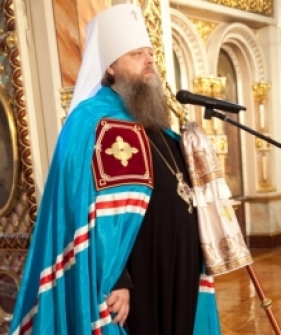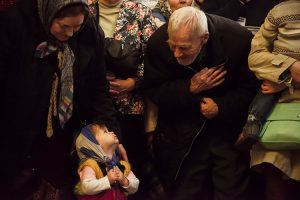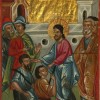 In the Name of the Father, and of the Son, and of the Holy Spirit!
In the Name of the Father, and of the Son, and of the Holy Spirit!
I cordially greet you all — reverend Fathers, brothers, and sisters — on this Sunday. Today at the Divine Liturgy we heard a passage from the Gospel in which the Holy Apostle transmits a slice of human life. It is very similar to the reality in which we all live. Just as in ancient Palestine, the Word of God is heard in all the churches. Then it sounded from the Savior’s mouth, and now it sounds from the pages of Holy Scripture.
Today there are people who are looking for Christ, who are striving to hear His Word, who are trying to find truth in their lives, just as the people who surrounded the Savior were. There are also those who want to know whether the Word of God is proclaiming the truth, like a certain lawyer who approached the Lord and tempted Him. There are also people who are trying on in their lives where the Lord would fit — in the center or on the periphery – exactly like the Pharisees who came to speak with the Lord. To the keepers of the law — to those who want to know about eternal life, about the main commandments, about the key that opens the Kingdom of God to us — the Lord says: “Thou shalt love the Lord with all thy heart, and with all thy soul, and with all thy mind, and thy neighbor as thyself.” Love contains within itself the fulfillment of the entire law. But the Holy Apostle says that love is higher than the law; the law is subservient to love, for if love leaves the world, the law will not be able to keep this world from destruction.
But for the Lord this response is not the most important, although He speaks of perfect love for God and man. This is difficult for us to understand, because we ourselves have not learned to love. Therefore the Lord, in response to the Pharisee, speaks of something else, leading to an understanding of this commandment: “And Who is Christ to you?” The Jewish people, who knew Holy Scripture well, knew that Christ would come from the seed of David, that Christ would be a descendent of King David. The Lord, trying to nudge the Pharisees towards a new perception of Divine Truth, says: “But why does David call Him Lord? If He is his son, then how can a father call his son Lord?”
This question threw the Pharisees into confusion; they could not answer it, because God’s essence cannot be understood by the mind alone; it is impossible to describe it scientifically. God is only known by our heart and by the experience of the spiritual life. This question addressed to us today is: Who is Christ to us? The Son of God by grace, come into the world in the image of man? Or an historical person? Or a mystical personage? Or one who teaches us the law? In what way do we try to accept God into our lives?
If the Christ that is in our lives is not He about Whom our Holy Mother Church teaches us, then this is not the Christ Who, taking us by the hand, will lead us through the gates of Eternity and bring us into His Kingdom. This is a Christ Who will remain only on the pages of a book and from Whose presence our soul will not quake. This is a Christ about Whom one can speak and do nothing, not changing anything in one’s life.
If we obtain Christ, living and acting in our lives, then a new commandment of love opens and operates for us. We begin to rethink our relationship towards ourselves, forcing ourselves to work on them to purify our lives from everything sinful. Through this, we discover our neighbor, and through him we discover God’s love for us, and our love for God.
The foundational question in our life is whether it is with Christ or without Him. The answer to this question is not in the pages of a book, but in the image of our life in God’s Church among the assembled people of God, of the same faith, praying with one mouth, and being nourished from the single Chalice of eternal life.
Translated from the Russian.


















